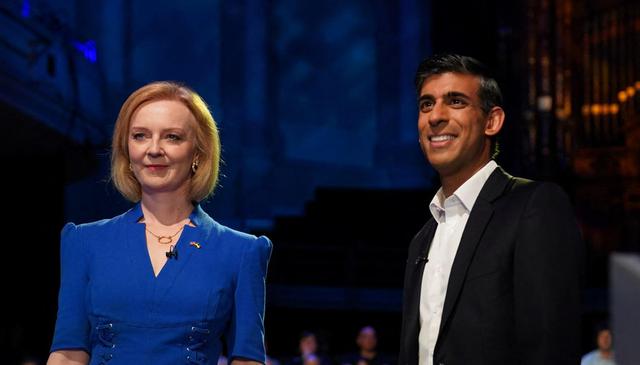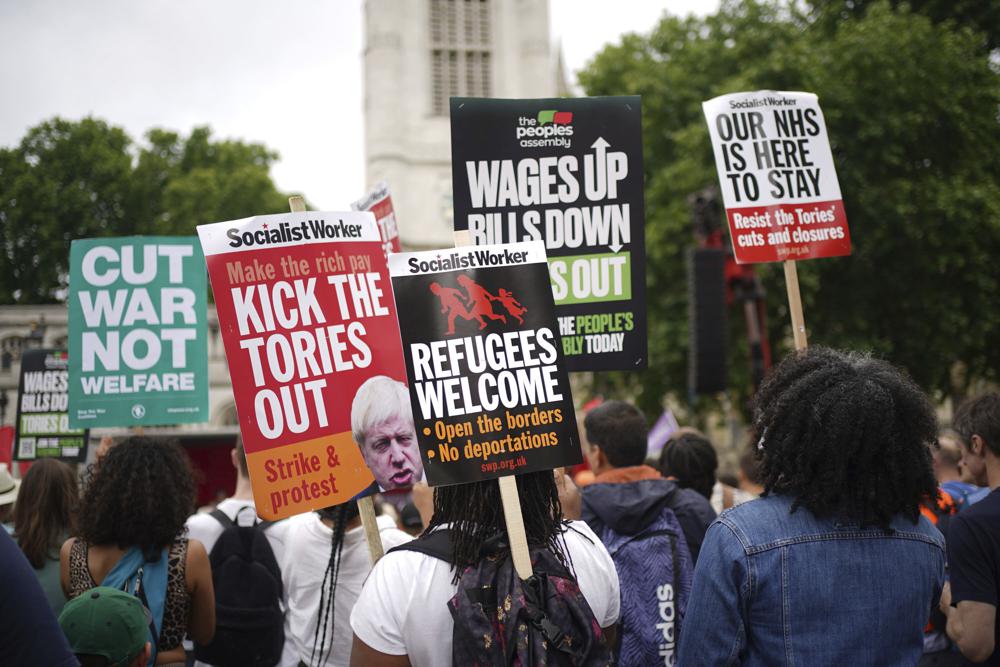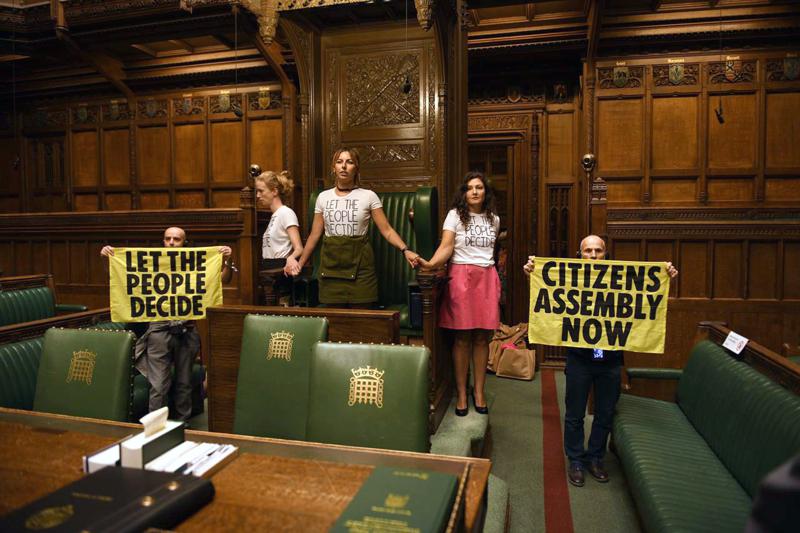UK preparing to welcome new PM amid soaring inflation, an energy crisis & likely protests
On Sept 5, the UK PM race will have a winner. A shaky economy, planned strikes, & an energy crisis are some challenges that await the next British PM.

On September 5, the intriguing battle to become the UK’s next Prime Minister will come to an end. The highs of victory will quickly give way to the realities of the task ahead for the winning candidate. A shaky economy, protests, planned strikes, and an energy crisis are some major challenges the next British Prime Minister will look to address within the first few months of assuming office.
The hustings between Rishi Sunak and Liz Truss – the two PM candidates – have largely focused on cost of living through tax and energy policies. While Sunak’s campaign has prioritised tackling inflation before lowering taxes, Truss has promised major tax cuts in order to address the cost of living.
Among other things, Truss, who remains the frontrunner in the UK PM race, has also pledged to introduce an emergency budget to rapidly lower taxes in the country. She claimed that her tax-cutting initiatives will “reduce inflation” and that she would maintain low tax rates as the Prime Minister of the country.
Sunak’s team has criticised Truss’ VAT proposal, saying that the measure would not assist families in paying their grocery bills because VAT is not paid on essentials like staple foods. They contended the plan was “highly regressive” with numerous flaws, and that it would only benefit people with higher incomes.

Apart from the soaring inflation, the next British Prime Minister will also need to address an escalating economic crisis fuelled by the ongoing Russia-Ukraine war. Additionally, the next PM will be facing a series of protests in the first few weeks after assuming office.
Staff at Britain’s business and energy department building have indicated that if an agreement with ISS cannot be reached, they would go on strike on September 13 and 14. Further, on September 2, followers of the environmental activist organisation Extinction Rebellion entered the House of Commons debating chamber and superglued themselves to the Speaker’s chair.
As the United Kingdom prepares to welcome a new PM, here’s a quick glance at three major challenges that the United Kingdom’s new prime minister will face in the first few weeks after taking oath:
Inflation
The rising cost-of-living crisis is putting pressure on both the leadership contenders and outgoing Prime Minister Boris Johnson, and the Bank of England has issued a recession warning. As the total measure of inflation surpassed 10% for the first time since the 1980s, the Bank of England increased rates by 0.5% points this month, the largest single increase in nearly 30 years.
According to government data, a fifth of UK households now face an average shortfall of £60 per week between what they earn and what they need to pay for necessities like electricity bills, rent, transportation, and food as people’s disposable income is at its lowest level in almost five years.

The UK’s inflation rate will reach 18% early in the following year, according to the Bank of England, therefore living will likely get harder. The Resolution Foundation thinktank has predicted that inflation may reach as high as 15% by early 2023, contrary to the Bank of England’s prediction that it will reach 13% by year’s end. The government has been urged by unions to raise the minimum wage in order to help families deal with inflation as they prepare for “a dismal fall and worse winter.”
Protests
Climate change:
Extinction Rebellion supporters entered the House of Commons debate chamber on September 2 and superglued themselves to the Speaker’s chair. Climate change protesters shared a photo of five people inside the chamber holding placards that read, “Let the people decide” and “Citizens’ Assembly immediately.”
Protesters padlocked themselves to gates outside Parliament and hanged a big banner with the same phrases from scaffolding on the estate. The House of Commons in the United Kingdom announced it was investigating an incident on the parliamentary estate. Certain parts of the parliamentary complex are normally open to the public, although entrance to the debating chamber is usually limited to guided tours.
Extinction Rebellion, a group known for causing days of traffic congestion in central London, often protests climate change issues. Climate activists argue that the Earth’s atmosphere cannot withstand any additional greenhouse gas emissions without causing catastrophic superstorms, unmanageable wildfires, massive sea-level rises, and substantial flooding. They are urging governments around the world to take immediate action to reduce hydrocarbon production and combustion.

Government employees’ strike:
The strike by cleaners, security guards, receptionists, mail room workers, and others at the Department for Business, Energy, and Industrial Strategy was called off on September 5 and 6, according to the Public and Commercial Services Union (PCS). The strike was called off after a meeting with managers from ISS, the company that employs the outsourced workers, who provided “substantial” concessions, according to the PCS.
However, the union announced that if an agreement with ISS cannot be reached, it will strike on September 13 and 14. Britain’s next leader will take office at a period of widespread industrial unrest, with union employees striking in a variety of industries as rising inflation drives demands for better pay.
Energy Crisis
According to an International Monetary Fund report, the energy crisis is having a greater impact on household budgets in the United Kingdom than in any other country in Western Europe. In the UK, the disparity between the cost burden on poor and rich households is likewise significantly greater than in other countries.
The reason for this is the UK’s reliance on gas to heat houses and generate energy at a time when Russia’s war in Ukraine has caused gas prices to skyrocket. Furthermore, the United Kingdom has the least energy-efficient dwellings in Western Europe. Based on future fossil fuel prices in May, which have since escalated, the IMF analysis projected the impact of the expected energy crisis for the entire year 2022.
It discovered that the average UK household will lose 8.3% of its entire spending power in 2022 as a result of increasing energy bills. In Germany and Spain, the figure is 4%, while only Estonian and Czech households experience bigger consequences than the UK across Europe.
Energy bill increases also raise the prices of other commodities, as vendors pass on the price increases. These indirect consequences will reduce UK family spending by further 2% in 2022. The IMF research accounts for people reducing their energy consumption as prices rise.
Liz Truss and Rishi Sunak’s plans
The frontrunner to the UK PM’s post, Liz Truss, has promised to not cut public spending, cancel a planned 6% corporate tax increase, and hold an emergency budget. She has also planned to scrap green levy imposed on energy bills and promised massive tax cuts.
Sunak, on the other hand, plans to increase corporation tax from 19% to 25% in April 2023 and has repeatedly said that he will make tackling recession his primary area of focus. Countering Truss’ plans, he has proposed eliminating the 5% VAT rate on domestic energy for a year if the typical household’s bill cap is raised to more than £3,000.



